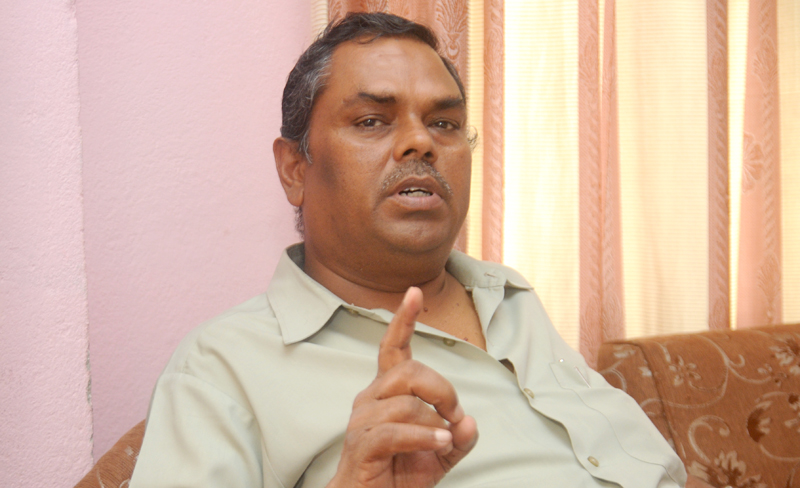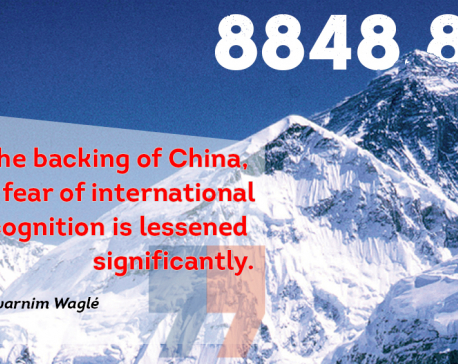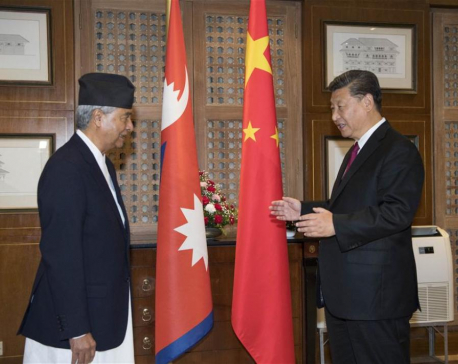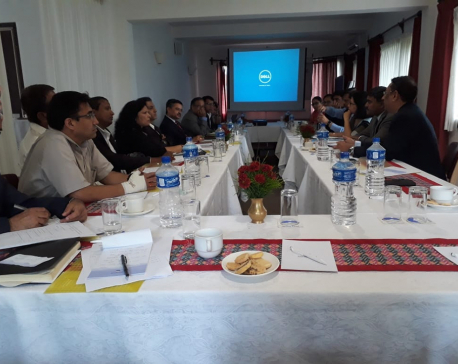
OR
Train to KTM: Not in my generation, says DPM Yadav
Published On: November 11, 2018 01:32 PM NPT By: Republica | @RepublicaNepal

KATHMANDU, Nov 11 : Even though the Oli-led government has vowed to enhance connectivity with China and India, Deputy Prime Minister Upendra Yadav has argued that connecting Nepal with Indian and Chinese railways will not be so easy.
In a recent interview with India's The Week magazine, Health Minister Yadav said that both the neighboring countries have assured Nepal to develop rail link in coming days.
"Mr Modi (Indian Prime Minister) has assured us that the rail link from India will come to Kathmandu very soon. China has also proposed a 78km rail link to Kathmandu. The day we have one train arriving from India and another from China, Nepal will be a connectivity hub. But this will not be easy. I do not see it happening in our generation," Yadav told during the interview.
Comparing the advantages of transit routes for Nepal via China and India, the minister said that Kolkata is the best option. "China has offered its ports to us, but the closest Chinese port is 3,000 km away, Kolkata [less than 1,000 km away] remains the best option," he said.
On a question regarding Nepal's expectations from China, the minister said that his country wants China's help in connectivity and infrastructure development. "After India, there is China," he said adding that Nepal has very good diplomatic relations with China.
"However, the dynamics we have with India are not there with China. We have an open border with India, there is a visa policy with China. Relations between India and China have improved vastly since the 1960s, and that is good for Nepal. If we all work together, our entire region will thrive," he said while comparing Nepal's ties with the two immediate neighbors.
During the interview, the minister said that he has found a perception in India that Nepal is leaning closer to China during his visits.
"When I go to India, I hear that Nepal is getting close to China. What I hear in China is exactly the opposite. In China, they even confuse us sometimes with Indians," he said.
Minister Yadav argued that India-Nepal relations cannot be measured within the parameters of diplomacy and politics. "They encompass a shared culture, economics and a common way of life," he said.
On the question regarding Nepal's expectations from India, Yadav said that India is Nepal's nearest neighbor.
"Our life and future is together, so we have to move forward together for economic development. We have to be better developmental partners. We have hydro resources, India needs power. India has large lands, we have water for irrigation. Our cooperation needs to pick up pace. We need to pick up pace. We need to discuss the technical issues or financial issues that are slowing us down," he said.
The minister also said that Nepal was not against the BIMSTEC military exercise held in India even though it decided to send observers only.
"That was a very small incident, it was not a definer of relations between two close countries. We sent observers, like Thailand did. Our internal preparations to participate in the exercise were not in place. We were not against the exercise, we simply weren't ready. This is what the prime minister told me," he added.
Even though India imposed a five-month economic blockade against Nepal after the country promulgated the new constitution in September 2015, Minister Yadav claimed during the interview that there was not inference in Nepal's constitution-making process.
The minister also said that it was Prime Minister KP Sharma Oli who talked about the Indian interference during the constitution-making process. "That was a political move to work upon a vote bank. First, to create an anti-Indian sentiment, then to cash in on that. This happens even in India and Pakistan politics," he said.
He also hit out at ruling Nepal Communist Party (NCP) regarding its way of dealing with India before and after 2017 elections in Nepal. "But after elections, those who raised these slogans are partnering with India, and even India reciprocated. These are vote bank politics and India knows that," he said.
You May Like This

Strategic symbolism of Mt. Everest’s new height
The joint announcement has strategic significance which can be understood against the backdrop of three geo-political-economic developments. ... Read More...

What is Nepali Congress thinking about China?
Some leaders are accusing China of land grab without verified and substantiated proof, while Nepali Congress leadership is pretending ignorance.... Read More...

Nepal, India to make concerted bid to complete two cross-border rail lines
KATHMANDU, July 9: Nepal and India have agreed to resolve all outstanding issues for completing a railway line from Jayanagar... Read More...










Just In
- Heavy rainfall likely in Bagmati and Sudurpaschim provinces
- Bangladesh protest leaders taken from hospital by police
- Challenges Confronting the New Coalition
- NRB introduces cautiously flexible measures to address ongoing slowdown in various economic sectors
- Forced Covid-19 cremations: is it too late for redemption?
- NRB to provide collateral-free loans to foreign employment seekers
- NEB to publish Grade 12 results next week
- Body handover begins; Relatives remain dissatisfied with insurance, compensation amount







Leave A Comment